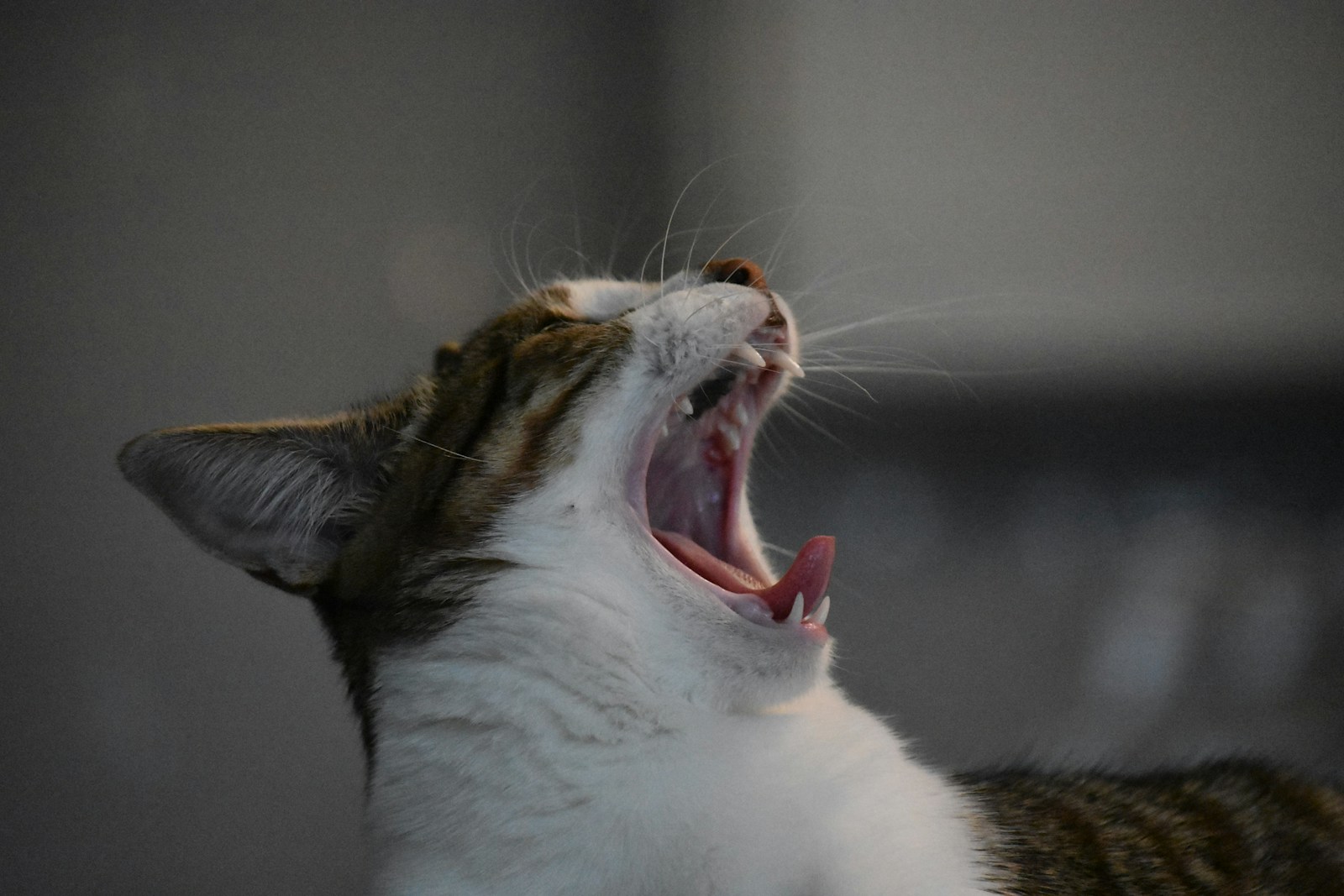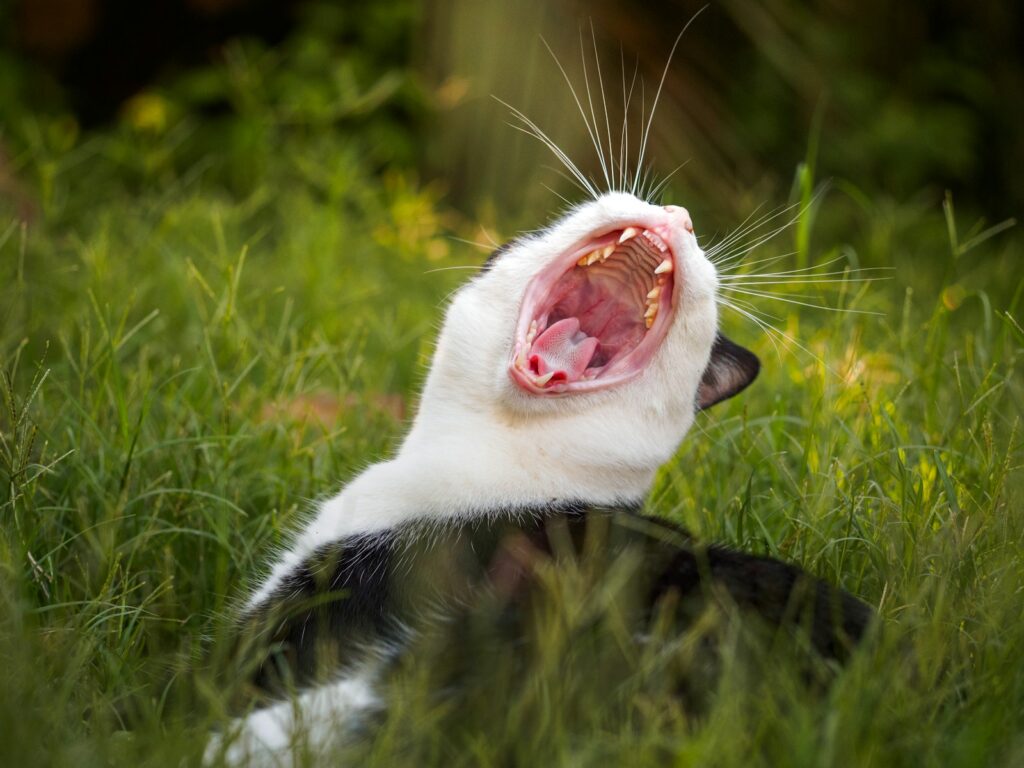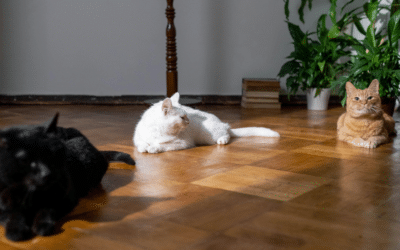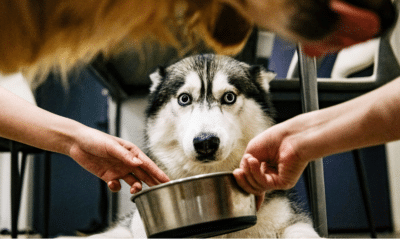To see where we currently operate, please view our Service Area section.
Kate’s K9 Pet Care proudly provides dog walking, cat sitting, small animal pet care, pet taxi services, “Almost Overnight” pet care, and convenient pet supply delivery. To see where we currently operate, please visit our Service Area Page .
If you’ve been asking yourself, “Why does my cat keep sneezing?” you’re not alone. Occasional sneezing in cats can be normal, just like it is for humans. But frequent or persistent sneezing might indicate an underlying condition that requires attention. Whether it’s a tickle from dust or a sign of a more serious issue, understanding the reasons behind your feline friend’s sneezing is essential for maintaining their healthThis guide will explore the common and not-so-common reasons for cat sneezing, potential symptoms to watch for, and the actions pet parents should take to keep their furry companions healthy.
Understanding Why Cats Sneeze
What is Normal Sneezing in Cats?
Just like humans, cats sneeze to clear irritants from their nasal passages. Occasional sneezing might be triggered by dust, pollen, or hidden irritants that dislodge with a quick and forceful sneeze. These instances are usually harmless and require no action.
When is Cat Sneezing a Concern?
If your cat is sneezing excessively or if the sneezing persists over several days, it could be time to dig deeper. Persistent sneezing may point to underlying issues such as viral or bacterial infections, chronic respiratory conditions, or even nasal polyps.
Book services online in just a couple minutes.
Being aware of the frequency, intensity, and accompanying symptoms will help determine if your sneezing cat needs veterinary care. Frequent sneezing, nasal discharge, difficulty breathing, or other serious complications should not be overlooked.
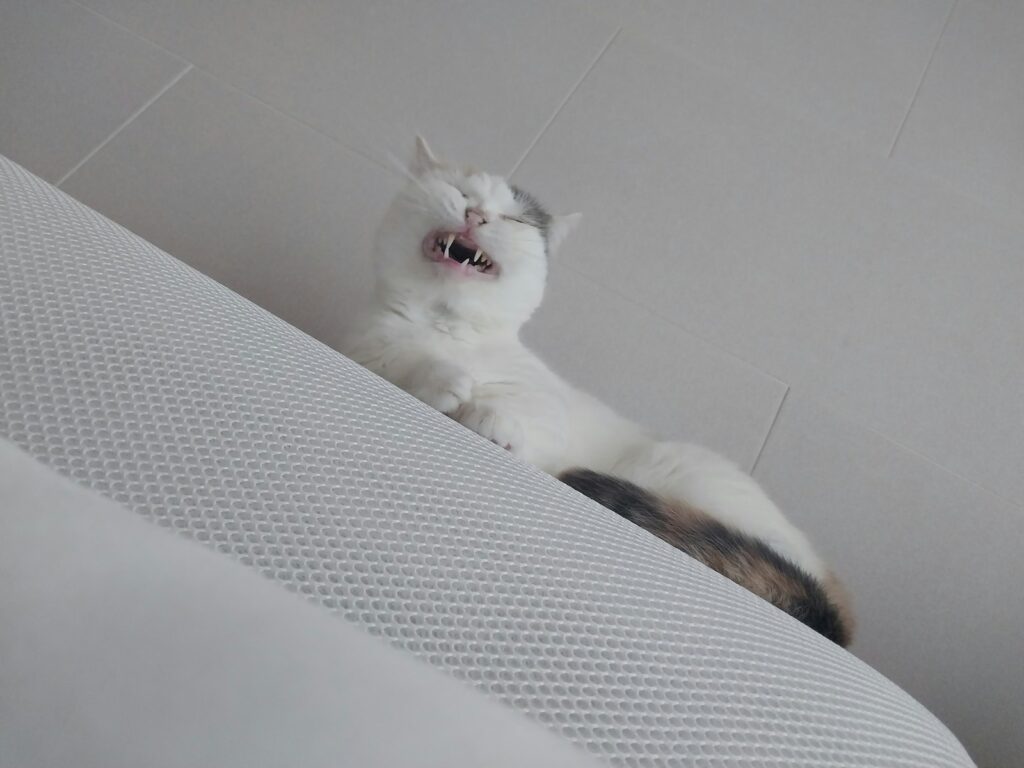
Symptoms to Watch For with Sneezing Cats
While sneezing is the most noticeable symptom, it’s often accompanied by other signs that reveal underlying health problems. Watch for:
- Nasal discharge (clear, yellow, or green)
- Watery eyes or swelling around the eyes
- Fever or dehydration
- Difficulty breathing
- Loss of appetite
- Lethargy
- Coughing or wheezing
- Bloody nasal discharge
If your cat’s sneezing is accompanied by one or more of these symptoms, seek veterinary care promptly.
What Should You Do if Your Cat Keeps Sneezing?
1. Monitor Their Symptoms
Pay attention to the patterns of sneezing, the presence of nasal discharge, and any related symptoms. Tracking this information can help your vet identify potential causes during your visit.
2. Keep Their Environment Comfortable
Ensure your cat’s environment is clean and free from dust, smoke, and other irritants. Maintaining optimal humidity can also help soothe their nasal passages.
3. Rule Out Major Concerns
If sneezing persists or worsens, visit the veterinarian. A professional will perform tests to identify the underlying cause, such as respiratory tract infections, nasal polyps, or chronic rhinitis.
4. Follow Proper Treatment Plans
Based on the diagnosis, your cat might be prescribed:
- Antiviral medications for viral infections
- Antibiotics for bacterial infections
- Anti-fungal medications for fungal infections
- Surgery or other interventions for nasal polyps or dental issues
5. Vaccinate and Boost Immunity
Keeping your cat vaccinated against upper respiratory viruses can reduce the risk of infections like the feline herpesvirus. A healthy diet and stress-free environment can also support your cat’s immune system.
When to See the Vet
It’s time to contact a veterinarian if:
- Sneezing persists for more than a week
- Your cat shows severe symptoms like difficulty breathing or nasal bleeding
- The sneezing is accompanied by significant lethargy or changes in behavior
- There are other signs of illness like fever or dehydration
Getting a proper diagnosis and treatment is essential to ensure your feline friend’s health and comfort.
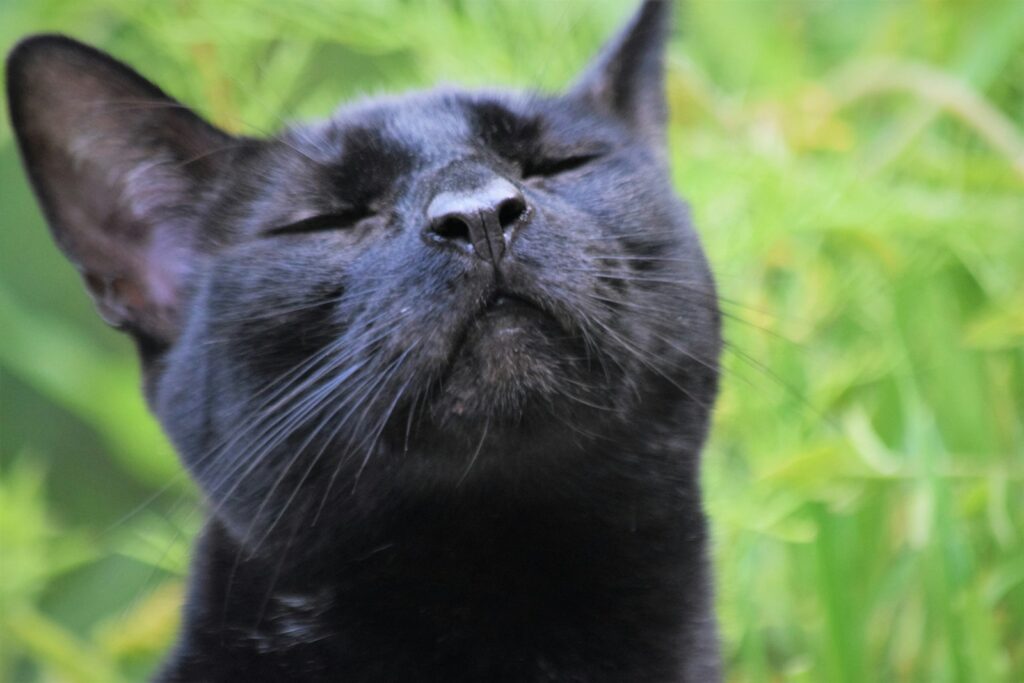
Other Common Behaviors in Cats: Normal or Cause for Concern?
Cats are known for their quirky and mysterious behaviors, but sometimes these actions can leave owners puzzled about whether they are normal or a sign of something more serious. Here are some common odd behaviors to watch for and what they might mean:
Head Shaking
If your cat repeatedly shakes its head, it might simply be trying to dislodge a piece of dirt or water. However, frequent head shaking can suggest ear problems such as mites, infections, or even painful polyps. It’s important to examine their ears and consult your veterinarian if the behavior persists.
Excessive Grooming
While cats are naturally fastidious creatures, excessively licking or grooming themselves can signal underlying problems such as skin allergies, parasite infestations like fleas, or anxiety. Keep an eye on any bald spots or red, irritated skin that might require attention.
Chirping or Chattering
Cats sometimes make a chirping or chattering noise, often when watching birds or small animals through the window. While this behavior may seem unusual, it is generally harmless and thought to be a sign of excitement or frustration. However, if vocalizations increase suddenly or seem distressed, it might be a symptom of pain or discomfort.
Sudden Bursts of Energy (“Zoomies”)
Many cats experience moments of seemingly random, high-energy sprinting around the house, often referred to as the “zoomies.” This is usually normal, and a way for cats to burn off excess energy. However, if it coincides with erratic behavior, restlessness, or scratching at certain areas, it could hint at potential issues like itchy skin or underlying discomfort.
Eating Non-Food Items
Some cats exhibit a behavior called pica, where they chew or eat non-food items such as plastic, fabric, or paper. While some curiosity is normal, frequent or persistent chewing may be a sign of stress, boredom, or a nutritional deficiency. It’s important to ensure your cat has a balanced diet and enough mental stimulation.
Monitoring these behaviors and understanding what is normal versus what may need medical attention can help ensure your feline friend stays healthy and happy. When in doubt, it’s always wise to consult a veterinarian to rule out any potential health concerns.
Top 6 Products and Brands for Cat Allergy Sneezing
If your cat is prone to sneezing due to allergies, there are several products available that can help soothe their symptoms and improve their overall comfort. Below is a list of the top 6 products along with links for easy purchasing:
Zesty Paws Allergy Immune Supplement for Cats
This immune-boosting supplement is packed with antioxidants and probiotics to help manage allergy symptoms in cats.
Feliway Classic Calming Diffuser
Feliway diffusers release pheromones that can help reduce stress in cats, which may indirectly alleviate sneezing caused by environmental allergens.
PetHonesty AllergySupport Chews for Cats
A natural solution for managing cat allergies, these chews promote a healthy immune system using ingredients like colostrum and salmon oil.
Vet’s Best Seasonal Allergy Relief for Cats
Made with plant-based ingredients like nettle leaf and quercetin, this supplement is designed to ease sneezing and other allergy-related issues.
Purina Pro Plan LiveClear Cat Food
This innovative cat food neutralizes allergens in your cat’s saliva, reducing allergenic dander and alleviating sneezing caused by environmental allergens.
Allerpet Cat Dander Remover
Allerpet is an excellent product for reducing allergens on your cat’s coat. It’s gentle, easy to apply, and can significantly reduce sneezing triggers for both you and your cat.
These products are designed to address various causes of cat sneezing, from environmental allergens to stress-related symptoms. Remember to consult your veterinarian before introducing new supplements or treatments to your cat’s routine.

Your Cat is Sneezing | Kate’s K9 Pet Care Is Here to Help!
If your feline friend isn’t feeling their best, don’t panic—Kate’s K9 Pet Care Services is here for all your pet care needs. Whether your cat needs a ride to the vet, you’re running low on pet supplies, or you just need an extra hand, we’ve got you covered.
- Safe, reliable transportation to vet appointments
- Pet supply delivery right to your door
- Compassionate care from pet lovers you can trust
Let us take the stress out of pet care—so you can focus on cuddles, not logistics.
Visit katesk9petcare.com to learn more and book today!
Closing Thoughts on Sneezing Cats | Why Does My Cat Keep Sneezing?
Frequent or persistent sneezing is more than just an adorable quirk. It’s your cat’s body communicating that something might be wrong. By understanding the possible causes, from mild allergies to viral respiratory infections, pet parents can take the right steps to keep their furry friend healthy and happy.
Spotting early warning signs and seeking veterinary care when necessary can make a world of difference. Always remember, even very mild symptoms might require attention to prevent them from developing into more serious complications. With proper care and attention, your feline companion can breathe easily and enjoy life to its fullest.
Curious about more ways to support your cat’s health? Visit [Brand Name] for tips and advice from experts in feline wellness.
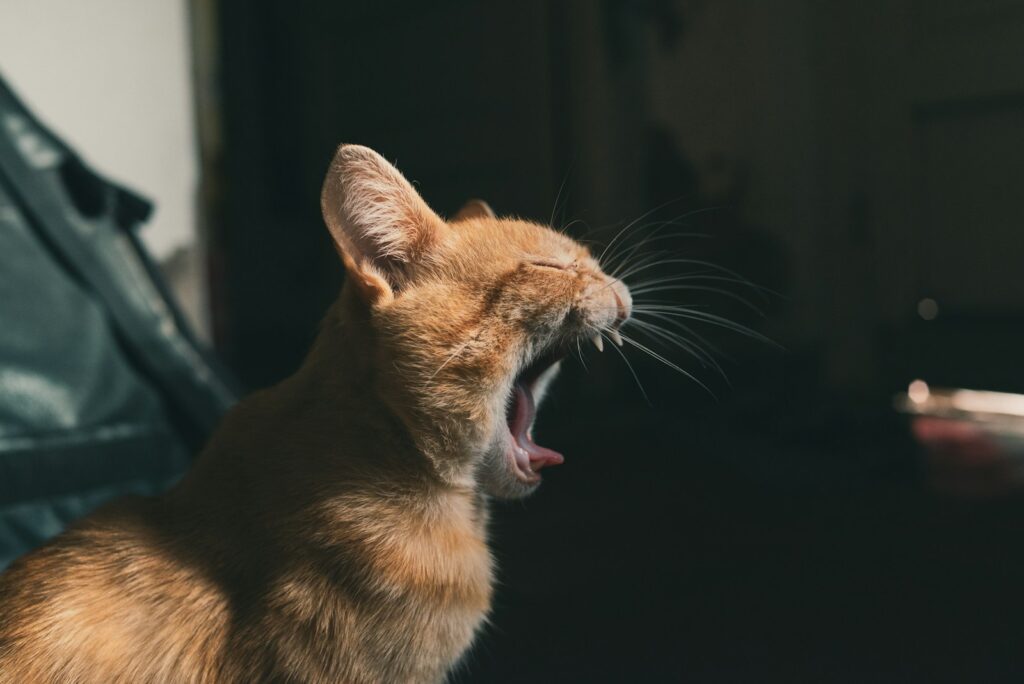
Common Causes of Cat Sneezing
1. Upper Respiratory Infections
Upper respiratory infections are among the most common causes of sneezing in cats. These infections are often caused by viral or bacterial infections, with feline herpesvirus and cat flu being notable culprits.
- Viral infections, like feline herpesvirus, can trigger sneezing, nasal discharge, fever, and even dehydration in infected cats.
- Bacterial infections can develop alongside viral respiratory infections, worsening symptoms such as nasal discharge and sneezing.
Pet parents should watch for other respiratory symptoms like watery eyes, coughing, or difficulty breathing. Antiviral medications or antibiotics prescribed by a veterinarian can help manage these infections and ease your cat’s sneezing.
2. Allergies and Environmental Irritants
Environmental allergens like pollen, dust, or cigarette smoke may irritate your cat’s nasal passages and trigger sneezing. Skin irritations, runny nose, and watery eyes may accompany allergy-related sneezing.
Keeping your cat indoors during high-pollen seasons, using air purifiers, and removing potential allergens can help reduce symptoms.
3. Foreign Objects
Sometimes, sneezing is the body’s way of reacting to foreign material trapped in the nasal cavity. Grass, debris, or other small objects may get lodged in your cat’s nose, causing sneezing to dislodge the irritant. If sneezing persists or is accompanied by nasal discharge, it’s best to seek veterinary care.
4. Chronic Respiratory Conditions
Conditions like chronic rhinitis or sinus infections can cause long-term sneezing and respiratory symptoms. These conditions often develop as a result of untreated infections or inflammation in the nasal cavity.
Keeping your cat’s nasal passages moist and working with your vet to manage chronic breathing issues can help alleviate symptoms.
5. Dental Disease
Believe it or not, dental health can impact your cat’s ability to breathe easily. Dental issues, particularly in the upper jaw, can spread infections to the nasal cavity. This connection often triggers sneezing in cats. If your cat is sneezing frequently and shows signs of oral pain, a dental check-up may help resolve the issue.
6. Nasal Growths or Polyps
Nasal polyps or tumors can obstruct the respiratory tract, leading to persistent sneezing and nasal discharge. Though rare, this issue can cause significant discomfort for your cat. Veterinary evaluation using imaging techniques is essential for a proper diagnosis.

Symptoms to Watch For with Sneezing Cats
While sneezing is the most noticeable symptom, it’s often accompanied by other signs that reveal underlying health problems. Watch for:
- Nasal discharge (clear, yellow, or green)
- Watery eyes or swelling around the eyes
- Fever or dehydration
- Difficulty breathing
- Loss of appetite
- Lethargy
- Coughing or wheezing
- Bloody nasal discharge
If your cat’s sneezing is accompanied by one or more of these symptoms, seek veterinary care promptly.
What Should You Do if Your Cat Keeps Sneezing?
1. Monitor Their Symptoms
Pay attention to the patterns of sneezing, the presence of nasal discharge, and any related symptoms. Tracking this information can help your vet identify potential causes during your visit.
2. Keep Their Environment Comfortable
Ensure your cat’s environment is clean and free from dust, smoke, and other irritants. Maintaining optimal humidity can also help soothe their nasal passages.
3. Rule Out Major Concerns
If sneezing persists or worsens, visit the veterinarian. A professional will perform tests to identify the underlying cause, such as respiratory tract infections, nasal polyps, or chronic rhinitis.
4. Follow Proper Treatment Plans
Based on the diagnosis, your cat might be prescribed:
- Antiviral medications for viral infections
- Antibiotics for bacterial infections
- Anti-fungal medications for fungal infections
- Surgery or other interventions for nasal polyps or dental issues
5. Vaccinate and Boost Immunity
Keeping your cat vaccinated against upper respiratory viruses can reduce the risk of infections like the feline herpesvirus. A healthy diet and stress-free environment can also support your cat’s immune system.
When to See the Vet
It’s time to contact a veterinarian if:
- Sneezing persists for more than a week
- Your cat shows severe symptoms like difficulty breathing or nasal bleeding
- The sneezing is accompanied by significant lethargy or changes in behavior
- There are other signs of illness like fever or dehydration
Getting a proper diagnosis and treatment is essential to ensure your feline friend’s health and comfort.

Other Common Behaviors in Cats: Normal or Cause for Concern?
Cats are known for their quirky and mysterious behaviors, but sometimes these actions can leave owners puzzled about whether they are normal or a sign of something more serious. Here are some common odd behaviors to watch for and what they might mean:
Head Shaking
If your cat repeatedly shakes its head, it might simply be trying to dislodge a piece of dirt or water. However, frequent head shaking can suggest ear problems such as mites, infections, or even painful polyps. It’s important to examine their ears and consult your veterinarian if the behavior persists.
Excessive Grooming
While cats are naturally fastidious creatures, excessively licking or grooming themselves can signal underlying problems such as skin allergies, parasite infestations like fleas, or anxiety. Keep an eye on any bald spots or red, irritated skin that might require attention.
Chirping or Chattering
Cats sometimes make a chirping or chattering noise, often when watching birds or small animals through the window. While this behavior may seem unusual, it is generally harmless and thought to be a sign of excitement or frustration. However, if vocalizations increase suddenly or seem distressed, it might be a symptom of pain or discomfort.
Sudden Bursts of Energy (“Zoomies”)
Many cats experience moments of seemingly random, high-energy sprinting around the house, often referred to as the “zoomies.” This is usually normal, and a way for cats to burn off excess energy. However, if it coincides with erratic behavior, restlessness, or scratching at certain areas, it could hint at potential issues like itchy skin or underlying discomfort.
Eating Non-Food Items
Some cats exhibit a behavior called pica, where they chew or eat non-food items such as plastic, fabric, or paper. While some curiosity is normal, frequent or persistent chewing may be a sign of stress, boredom, or a nutritional deficiency. It’s important to ensure your cat has a balanced diet and enough mental stimulation.
Monitoring these behaviors and understanding what is normal versus what may need medical attention can help ensure your feline friend stays healthy and happy. When in doubt, it’s always wise to consult a veterinarian to rule out any potential health concerns.
Top 6 Products and Brands for Cat Allergy Sneezing
If your cat is prone to sneezing due to allergies, there are several products available that can help soothe their symptoms and improve their overall comfort. Below is a list of the top 6 products along with links for easy purchasing:
Zesty Paws Allergy Immune Supplement for Cats
This immune-boosting supplement is packed with antioxidants and probiotics to help manage allergy symptoms in cats.
Feliway Classic Calming Diffuser
Feliway diffusers release pheromones that can help reduce stress in cats, which may indirectly alleviate sneezing caused by environmental allergens.
PetHonesty AllergySupport Chews for Cats
A natural solution for managing cat allergies, these chews promote a healthy immune system using ingredients like colostrum and salmon oil.
Vet’s Best Seasonal Allergy Relief for Cats
Made with plant-based ingredients like nettle leaf and quercetin, this supplement is designed to ease sneezing and other allergy-related issues.
Purina Pro Plan LiveClear Cat Food
This innovative cat food neutralizes allergens in your cat’s saliva, reducing allergenic dander and alleviating sneezing caused by environmental allergens.
Allerpet Cat Dander Remover
Allerpet is an excellent product for reducing allergens on your cat’s coat. It’s gentle, easy to apply, and can significantly reduce sneezing triggers for both you and your cat.
These products are designed to address various causes of cat sneezing, from environmental allergens to stress-related symptoms. Remember to consult your veterinarian before introducing new supplements or treatments to your cat’s routine.

Your Cat is Sneezing | Kate’s K9 Pet Care Is Here to Help!
If your feline friend isn’t feeling their best, don’t panic—Kate’s K9 Pet Care Services is here for all your pet care needs. Whether your cat needs a ride to the vet, you’re running low on pet supplies, or you just need an extra hand, we’ve got you covered.
- Safe, reliable transportation to vet appointments
- Pet supply delivery right to your door
- Compassionate care from pet lovers you can trust
Let us take the stress out of pet care—so you can focus on cuddles, not logistics.
Visit katesk9petcare.com to learn more and book today!
Closing Thoughts on Sneezing Cats | Why Does My Cat Keep Sneezing?
Frequent or persistent sneezing is more than just an adorable quirk. It’s your cat’s body communicating that something might be wrong. By understanding the possible causes, from mild allergies to viral respiratory infections, pet parents can take the right steps to keep their furry friend healthy and happy.
Spotting early warning signs and seeking veterinary care when necessary can make a world of difference. Always remember, even very mild symptoms might require attention to prevent them from developing into more serious complications. With proper care and attention, your feline companion can breathe easily and enjoy life to its fullest.
Curious about more ways to support your cat’s health? Visit [Brand Name] for tips and advice from experts in feline wellness.
